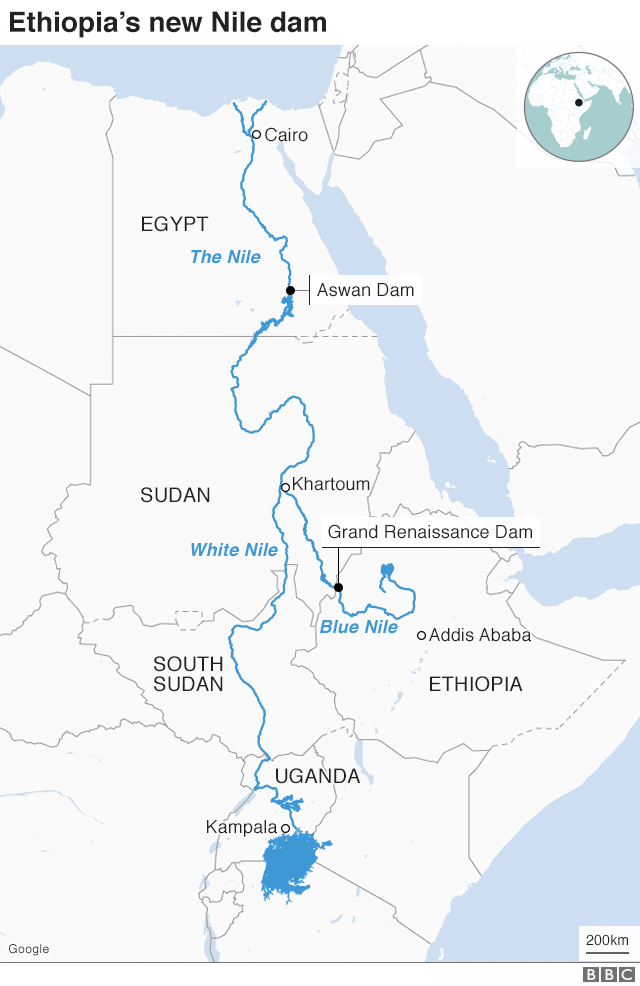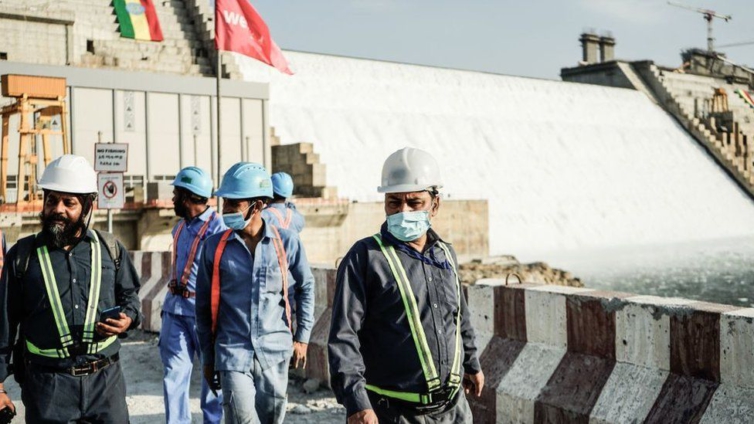A controversial Ethiopian dam on the Blue Nile river began generating electricity for the first time on Sunday, according to state TV.
The $4.2bn (£3.8bn) dam, located in the western Benishangul-Gumuz region, has been a source of contention between Ethiopia, Egypt and Sudan since its construction started in 2011.
Sudan and Egypt fear the project could reduce their share of Nile waters.
Ethiopia insists the dam is key to its development.
The so-called Grand Ethiopian Renaissance Dam (Gerd) is Africa's biggest hydroelectric project to date.
The Gerd is expected to generate over 5,000 megawatts of electricity, doubling the nation's electricity output when it is fully completed.
It is currently 83.9% complete, the state-owned ETV News channel said on Sunday.
The Ethiopian government insists it will transform the national economy, which has been severely damaged by drought and war, when it is fully operational.
A spokesman for Prime Minister Abiy Ahmed's office called it a "monumental day for Ethiopia".

But the dam's construction has led to discord with Egypt and Sudan.
Ethiopia has been diverting Nile water to fill a vast reservoir behind the dam.
Egypt, which lies downstream and depends almost completely on the Nile for its irrigation and drinking water, is worried this will affect the levels of water flowing into the country.
It therefore wants a guarantee of a certain of volume of water coming into Egypt.
But Ethiopia is reluctant to be tied to a certain figure of how much water to release as its priority is to make sure there is enough water to operate Africa's largest hydroelectric plant.
Sudan is also worried about how the dam will affect its water levels.
Last year, Sudan was taken by surprise when Ethiopia decided to shut three of the four diversion outlets for the water.
This led to lower levels of water going downstream which disrupted Sudan's pumping stations for irrigation and municipal water supply.
Both countries have been vying for a deal with Ethiopia over the filling and operation of the damn, but negotiations have failed to make headway.
Latest Stories
-
CAFCL: Al Ahly set up historic final with ES Tunis
16 mins -
We didn’t sneak out 10 BVDs; they were auctioned as obsolete equipment – EC
4 hours -
King Charles to resume public duties after progress in cancer treatment
5 hours -
Arda Guler scores on first start in La Liga as Madrid beat Real Sociedad
5 hours -
Fatawu Issahaku’s Leicester City secures Premier League promotion after Leeds defeat
5 hours -
Anticipation builds as Junior Speller hosts nationwide auditions
5 hours -
Etse Sikanku: The driver’s mate conundrum
6 hours -
IMF Deputy Chief worried large chunk of Eurobonds is used to service debt
6 hours -
Otumfuo Osei Tutu II celebrates 25 years of peaceful rule on golden stool
6 hours -
We have enough funds to pay accruing benefits; we’ve never missed pension payments since 1991 – SSNIT
7 hours -
Let’s embrace shared vision and propel National Banking College – First Deputy Governor
7 hours -
Liverpool agree compensation deal with Feyenoord for Slot
8 hours -
Ejisu by-election: There’s no evidence of NPP engaging in vote-buying – Ahiagbah
8 hours -
Ejisu by-election: Independent ex-NPP MP’s campaign team warns party against dubious tactics
8 hours -
ZEN Petroleum supports Tse-Addo Future Leaders School
9 hours

